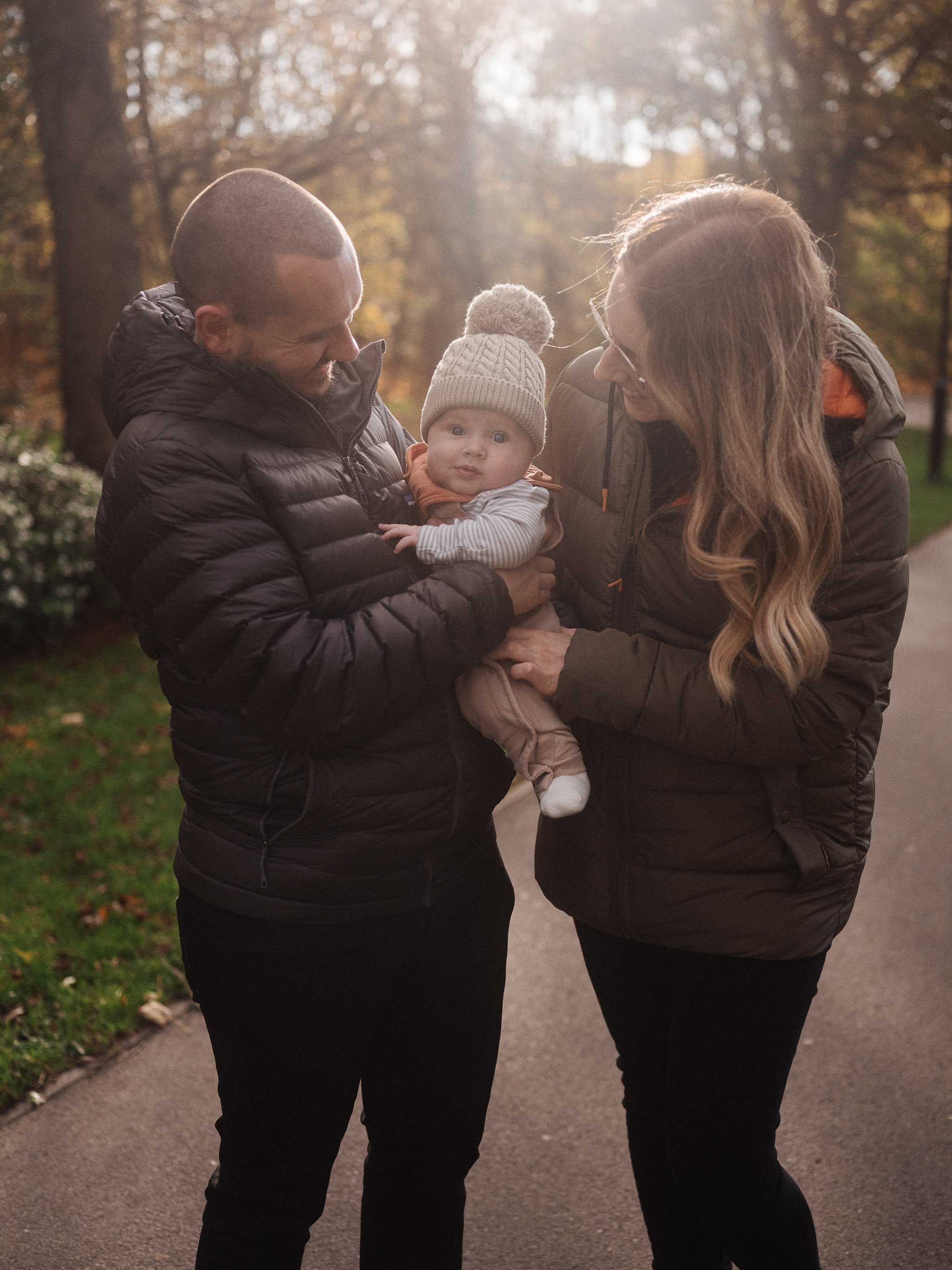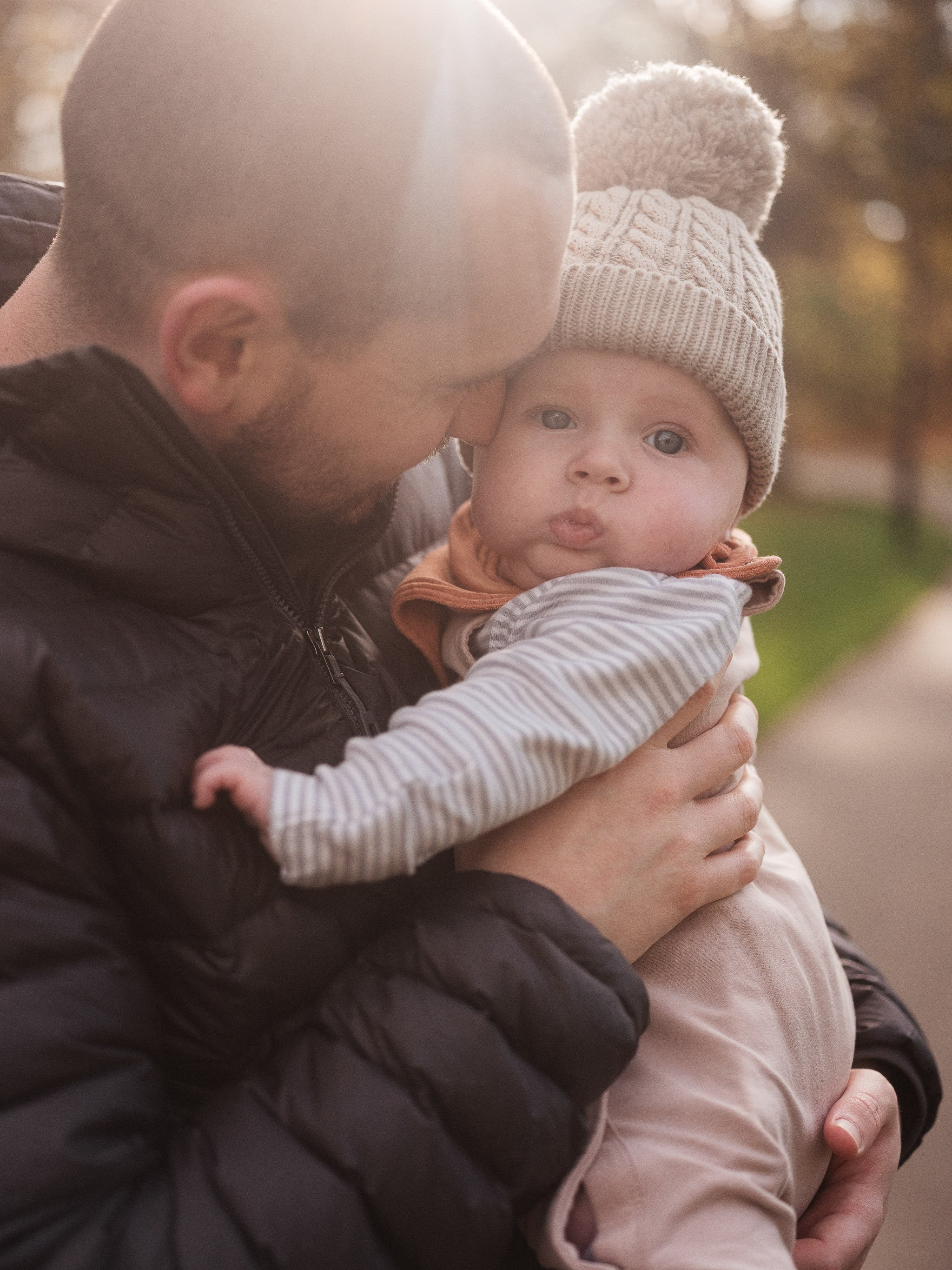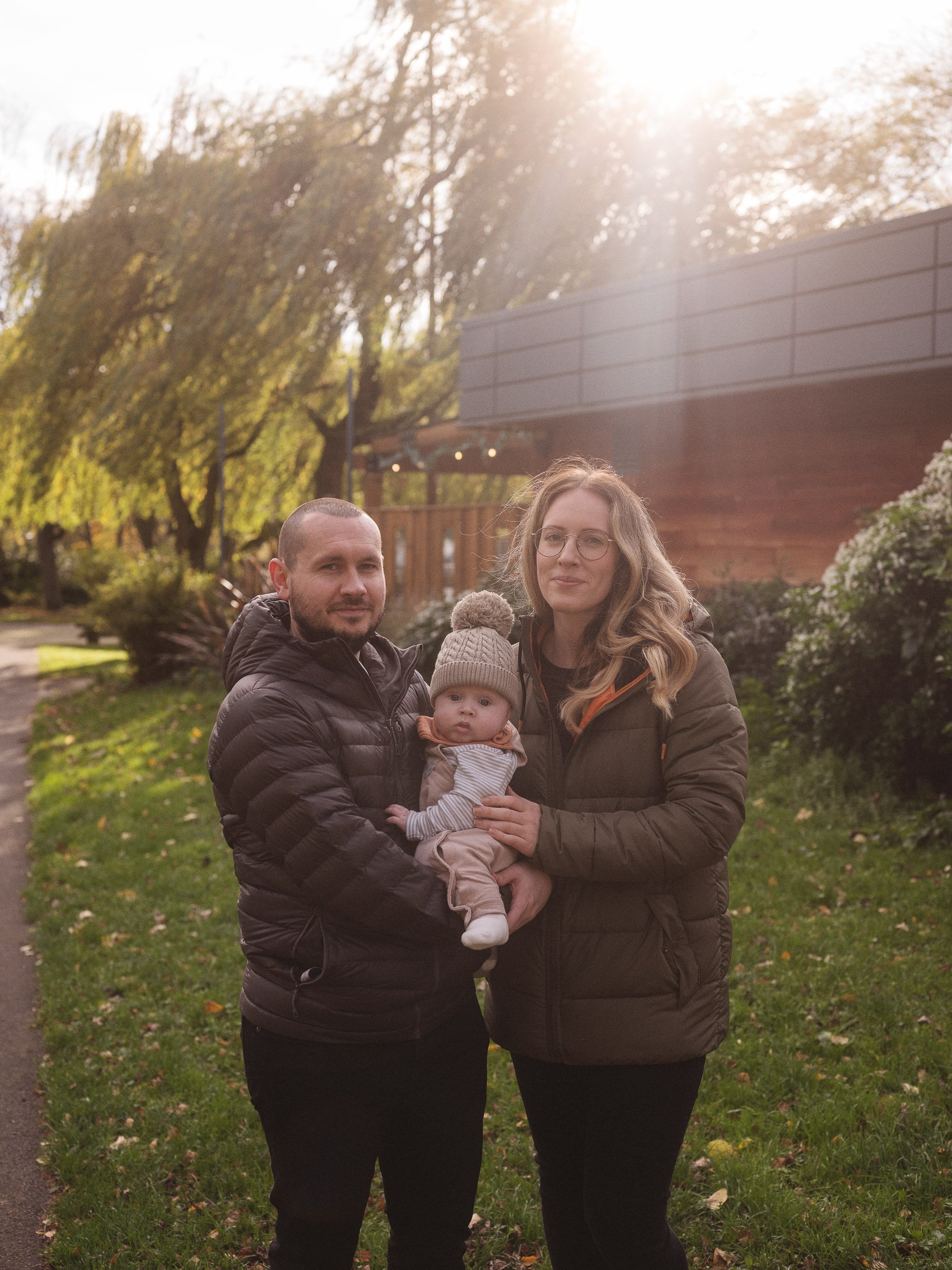Paternal
Parity
The UK’s Paternity and Shared Parental Leave entitlements are among the least generous in Europe, but for Sunderland’s Paul Blyth a new job with Swedish giants Spotify meant a chance to sample the Scandi way of doing things.
Interview by Arlen Pettitt
Photographs by Christopher Owens
"Everybody has been so surprised when I tell them about the package of leave. They can't wrap their heads around it. It's better than Laura's."
Paul Blyth and his partner Laura Young were already expecting their first child - a baby boy, Jude, born in June - when he came to switch jobs at the start of the year.
We meet in a cafe in Newcastle and, as Jude snoozes on Laura’s lap, the couple - who live in Sunderland - tell me how what would typically be a stress-inducing situation actually brought them an unexpected opportunity to spend time together as a new family.
As an experienced software engineer, Paul’s skills are in demand, and he swiftly found himself with two offers on the table.
The first was with a US-based start-up, the other was with global giant Spotify.
There was no contest once Spotify had outlined their package.
"The recruiter had been asking me what my situation was,” Paul explains, “I said ‘we’ve got a baby on the way’ and they said ‘you know we've got six month’s parental leave?’ That became the deciding factor."
Despite the other role having a higher base salary, the firm initially only offered the UK's legal minimum leave for new fathers - although they did make a late, informal offer to improve this in an attempt to sway Paul.
“Everybody has been so surprised when I tell them about the package of leave. They can't wrap their heads around it. It's better than Laura's.”
As standard, fathers in the UK receive just two weeks of Paternity Leave, which must be taken within 56 days of the birth and is paid at a statutory rate of £156.66 per week.
Since 2015, couples also have the option of Shared Parental Leave, where a mother can pass up to 50 weeks of her leave and 37 weeks of her pay to their partner. This can be taken in up to three blocks, must be taken within the first year after the child's birth, and obviously requires the mother to give up leave she may wish to take herself.
The financial question is a difficult one too, as while Statutory Maternity Pay includes six weeks at 90% of normal pay, Shared Parental Pay is given at a statutory rate of £156.66, the same as Paternity Leave.
In a region like the North East, where the average annual salary for a woman is more than £10,000 below that of a man, it’s not difficult to see how finances can become a significant barrier to take-up.
These factors contribute to the UK being ranked just 27th by the OECD for paid leave reserved for fathers, and 23rd by Unicef for father’s share of total leave.
Spotify's scheme, however, is a product of the far more generous entitlement which is typical in Sweden, where the streaming service is headquartered.
Employees are able to access parental leave as soon as they pass their probationary period with the firm, and it's a world apart from the UK's scheme.
"I get full pay for six months and my leave can be spread over the first three years of Jude's life,” explains Paul, meaning the question wasn’t so much how, but when, to take leave.
“There was a lot of pondering whether we should do it all in one go, like we've done, or save it up because you can do it in two month chunks. Would it be better to take two months in the summer? Or when he’s a bit older and more active?”
As well as the formal entitlement, Spotify’s corporate culture is also geared towards family life, with recognition from management of the balancing act employees engage in, and an acceptance of taking leave as the norm.
For Paul, that became clear early on in his time there.
“I’d been in the job about two months,” he says, “and we had a Product Area meeting in Stockholm and my manager’s manager - who I had never really spoken to - came over and said “Hello, Paul I hear you're expecting!””
Taking leave is so common that Paul and one of his new colleagues started their leave on the same day. That's two out of the immediate team of three: "So, we've left one person…but they were fine with it! In fact, my whole squad was so supportive - from being flexible around my commitments at home when arranging synchronous comms to offering to pick up some of my workload when we'd had a rough time with Jude”
Even before he started his Parental Leave, Paul benefited from the company’s flexible working policies, after returning to work having topped up his initial two week’s Paternity Leave with annual leave.
“Those four first four weeks, just disappeared, flew by,” he says. “But because I was working from home and, as a company, they’re pretty flexible about working hours there were a few occasions where I’d basically shift my working day. I would take Jude for the morning so Laura could have a bit more sleep.”
There’s a lesson here for firms in the UK on how to make things easier for parents, giving them the chance to be present and proactive in those early weeks.
As Paul puts it, “you get the flexible working bit right and you can let people steal time back to be with family, even if you can't afford to give them six months off.”
With skills in short supply, and remote working now the norm in many industries, firms aren't just competing locally for talent, but globally. Unless they adjust benefits packages, they risk finding themselves coming off second best in the chase for talent - just as happened with Paul's failed suitors.
There’s a macroeconomic argument too.
"It felt like everything had been hard. It felt incredible. It makes things so simple, and it helps Jude to bond with Paul as well. It's kind of a given that fathers do find it a lot more difficult to bond with their babies.”
The UK has a myriad of regional inequalities - median pay is £180 per week lower in the North East than London, life expectancy is falling in seven of nine English regions, and productivity is falling in every region outside London.
These are all substantial challenges which need the country to reach for every possible solution and will require the healthiest, most active and engaged workforce possible - including mothers and fathers.
The World Bank points to adequate paid parental leave as having benefits as broad as reduced infant mortality, increased pay for mothers and increased female employment.
In the UK specifically, a report into maternity care published in November by a partnership including Newcastle upon Tyne Hospitals NHS Trust and the University of Oxford found the maternal mortality rate increasing amongst those in the most deprived areas. The report includes the alarming statistic that in 2020 women were three times more likely to die by suicide during pregnancy or up to six weeks after birth than they were in 2017-19.
The obvious conclusion is that formal structures of support aren’t working as they should.
While their situation is far less extreme, it’s clear being available and able to support Laura was a key motivator for Paul both taking leave, and taking it in the full six month chunk he has.
Following a difficult pregnancy for Laura, Jude was required to wear a harness for several months to correct a hip condition, making day-to-day things like bathing, feeding or just holding him more complicated. All of which meant the extra pair of hands were really valuable.
“It felt like a weight had been lifted that first day when Paul started his leave,” Laura says. “It felt like everything had been hard. It felt incredible. It makes things so simple, and it helps Jude to bond with Paul as well. It's kind of a given that fathers do find it a lot more difficult to bond with their babies.”
Paul recounts a story of a meeting with the Health Visitor, who asked about Jude’s ability to recognise and follow Paul’s movements in and out of the room, something he was able to demonstrate with a smiley reaction to a father-son game they played.
“I don't know if I would have had that same thing if I was only seeing him for a couple of hours before he went to bed during the day, five days a week,” says Paul, who lights up talking about witnessing this kind of development, both at home and when attending baby classes.
“Doing those things…it’s incredible,” he says. “Seeing him progress from not being interested in things to then grabbing them, to shaking them. I would have missed out on a lot.”




“I'm an exception as one of the few fathers who are there, and even more so on their own. When you've got time to think and you're looking around and it's just a group of mothers and their babies and they're doing all the things that Laura would normally have been doing if I wasn't. It feels a bit weird, because there's no one else in the same situation as me.”
The overall sense I get from both Laura and Paul is one of almost disbelief at what they’ve been able to do. Something Laura touches on when she suggests they sometimes downplay it with parent friends to avoid “rubbing it in.”
“I can't imagine how other people do it,” she says. “Just being on their own for the whole day, and having to wait until their partner comes back. We are sharing the load really quite equally.”
As his parents debate who has the best bond with him, Jude continues to sleep on Laura’s lap, impervious as only a baby can be to the sounds of the busy cafe we’ve met in.
Amongst the chatter and clatter of crockery, there are also plenty of kids running circles around their mothers and demanding second slices of cake - what there aren’t, I note, are any dads besides Paul.
I ask him how he feels attending classes and being out and about by himself with Jude.
"Just the other day Laura was sleeping after doing the night feeds and I took Jude to the baby class during the day," he says.
"I'm an exception as one of the few fathers who are there, and even more so on their own. When you've got time to think and you're looking around and it's just a group of mothers and their babies and they're doing all the things that Laura would normally have been doing if I wasn't. It feels a bit weird, because there's no one else in the same situation as me."
It's an unfamiliar environment, I suggest, intimidating even. Paul nods. "There was a couple at one of the classes we went to, where I'd been for a few weeks and then I missed a week for whatever reason, and another woman at the class brought her partner along because she thought that I’d be there. And then I wasn't and that partner never came back. I went back the week after and she's like, ‘Oh, you’re here this time!’ I got the impression he was going because he thought he wouldn’t be the only father."
A paper published in April 2020 by the Government Equalities Office suggested low take up of Shared Parental Leave - it’s been estimated that only 2% of eligible couples in the UK make use of it - was the result of defaulting to gender norms over caring roles, as well as a lack of awareness amongst parents, and poor communication from employers.
We end our time together talking about my own stint as one of the 2%. I took Shared Parental Leave at the end of 2019 when my son was six months old, taking over as my wife went back to work. Having sat to work through the paperwork with my employer, who had never gone through the process, I was on leave for three incredibly rewarding months, but often found myself as the only dad at the weigh-in clinics and the sensory classes.
Based on Paul's experience three - admittedly unusual - years later, there's not much that’s changed on that front. But the benefits he and Laura are feeling from properly funded and accessible leave are clear, not least because parenting, as Paul says, is "a learning on the job situation. Having the freedom to take your time to learn on the job is massive."
"The more we can do for paternity leave the better," he adds, before joking "I’d consider having another baby to get another six months!"
Learn More





